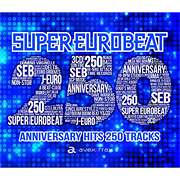
Back Евробийт Bulgarian Eurobeat Catalan Eurobeat Czech Eurobeat Greek Eŭrobato EO Eurobeat Spanish Eurobeat Finnish Eurobeat French יורוביט HE Eurobeat ID
| Eurobeat | |
|---|---|
 Super Eurobeat Vol. 250 cover art | |
| Stylistic origins | |
| Cultural origins | British Eurobeat: Mid 1980s, United Kingdom Contemporary Eurobeat: Late 1980s, Italy, West Germany and Japan |
| Fusion genres | |
| J-pop[4][5] | |
| Regional scenes | |
| Other topics | |
Eurobeat refers to two styles of dance music that originated in Europe: one is a British variant of Italian[3] Eurodisco-influenced[6] dance-pop, and the other is a hi-NRG-driven form of Italo disco. Both forms were developed in the 1980s.
Producer trio Stock Aitken Waterman and pop band Dead or Alive made Eurobeat music more popular in the United States and Southeast Asia, where Eurobeat was historically marketed as hi-NRG (pronounced as "high energy"). For a short while, it also shared this term with early freestyle music and Italo disco.
- ^ Cite error: The named reference
Arenawas invoked but never defined (see the help page). - ^ Cunningham, Mark "Good Vibrations: A History of Record Production" (Sanctuary Music Library), Alan Parson (Introduction), Brian Eno (Introduction) Sanctuary Publishing, Ltd; 2 edition (1998, Digitized 20 May 2010). ISBN 1-86074-242-4, ISBN 978-1-86074-242-2
- ^ a b c David D. Laitin, Robert Schuman Centre (2000). Culture and National Identity: "the East" and European Integration. European University Institute. Page 14.
- ^ Keizai, Kokusai & Zaidan, Kōryū (cont.) "Japan Spotlight: Economy, Culture & History, Volume 23". Page 24 (Ng Wai-ming: "The Rise of J-Pop in Asia and Its Impact"). Japan Economic Foundation & the University of California. 2004. Quote: "JAPANESE pop music is commonly I referred to as "J-pop", a term coined by Komuro Tetsuya, the "father of J-pop", in the early 1990s. The meaning of J-pop has never been clear. It was first limited to Euro-beat, the kind of dance music that Komuro produced. However, it was later also applied to many other kinds of popular music in the Japanese music chart, Oricon, including idol-pop, rhythm and blues (R&B), folk, soft rock, easy listening and sometimes even hip hop."
- ^ Society for Asian Music (2003). "Asian Music: Journal of the Society for Asian Music, Volume 34, Issue 1". Page 1 ("Japanese Popular Music in Singapore"). The University of California.
- ^ Ang, Ien & Morley, David (2005). "Cultural Studies: Volume 3, Issue 2". Routledge. pgs. 171, 173, 170. ISBN 9781134957927. "Eurorecords had to have immediate cross-national appeal, musical simplicity was of the essence- a bouncy beat, just one chorus hook, elementary lyrics. The fun of these records was entirely a matter of sound quality, but once a record was a hit it took on a kind of sleazy, nostalgic charm of its own. It was precisely the brazen utility of these records, in short, that gave them gay disco consumer appeal too.[...] Eurodisco also had an obvious element of camp -British club audiences took delight in the very gap between the grand gestures of Eurosingers and the vacuity of their songs."
Cite error: There are <ref group=lower-alpha> tags or {{efn}} templates on this page, but the references will not show without a {{reflist|group=lower-alpha}} template or {{notelist}} template (see the help page).